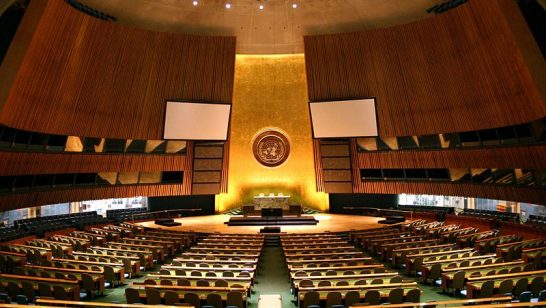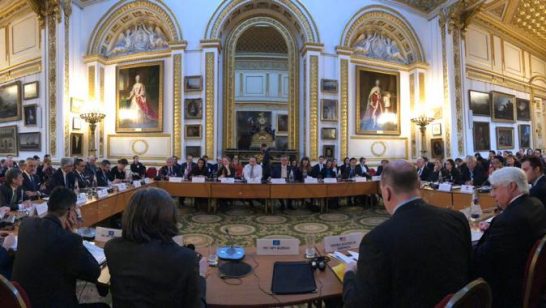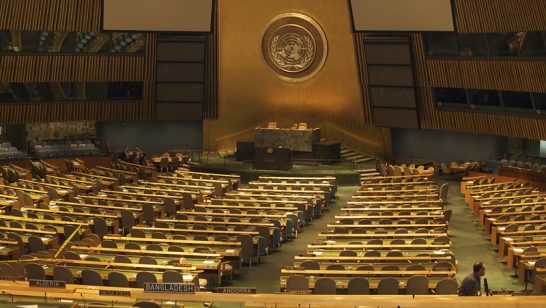
The Creating an Environment for Nuclear Disarmament (CEND) initiative, launched by the US in 2019, is one of many recent efforts to jumpstart progress towards disarmament in the lead-up to the May 2020 Review Conference (RevCon) of the Nuclear Non-Proliferation Treaty (NPT). Other initiatives include the 2017 Treaty on the Prohibition of Nuclear Weapons (TPNW), the Swedish “stepping stones” project, and efforts by various governments and non-governmental organisation to reduce nuclear risks. To strengthen the global nuclear order, these initiatives need to incorporate issues including emerging technology, regional dynamics, and humanitarian issues, which are currently under-represented in traditional forums, such as the NPT.
These new forums come at a time of increased pressure not only because of the RevCon but also because of a changing nuclear landscape. New technologies, such as Artificial Intelligence, and increasing geopolitical competition, including regional conflicts such as the 2019 India-Pakistan crisis, raise questions about the ability of the existing nuclear order to respond to these changes. While bodies such as the NPT and Conference on Disarmament (CD) remain the essential foundation of the global nuclear order, new supplemental tools and forums are necessary to address the rapidly changing environment.
At present, current institutions underpinning the global nuclear order are not fit for purpose. New forums, such as CEND and “stepping stones”, serve a practical purpose of generating new ideas for promoting nuclear disarmament and reducing nuclear risk. These complement rather than compete with the existing fora. Nuclear dialogues are not a zero-sum game- the creation of a new forum does not come at a cost to the NPT but rather can contribute to the common causes of nuclear disarmament and non-proliferation.
The current nuclear order is not fit for purpose
A 2011 study by UNA-UK posed the question of whether the NPT was “fit for purpose”. The report looked at issues such as nuclear latency, diverging views on how to achieve nuclear disarmament and the threat of nuclear terrorism. Ultimately, the report describes a “networked” nuclear regime, wherein the NPT is the “core instrument”, but the regime as a whole includes instruments that predate the NPT along with new “bolt-on” efforts. While this analysis focused on non-proliferation, it offers a useful model for how the nuclear order might promote disarmament while adapting to contemporary challenges.
New nuclear realities include emerging technology, regional conflict, a return to “great power” competition, and a growing number of dual-capable military systems. These increase the risks of nuclear escalation and conflict. To take one example, Dr James Acton has highlighted the risks of “entanglement” where a cyber-attack on conventional command and control could knock out nuclear command and control and lead to inadvertent escalation across the nuclear threshold. Existing nuclear forums are not addressing these issues. While incorporating them into the NPT or returning to treaty-based arms control (such as a multilateral Intermediate Nuclear Forces (INF) Treaty) is desirable, this may not be practical for the foreseeable future.
A more immediate response has been to create new “bolt-on” initiatives. In addition to the Swedish “stepping stones” approach, Germany is leading an initiative on emerging technology and arms control, a US based NGO the Nuclear Threat Initiative launched the Global Enterprise to Strengthen Non-Proliferation and Disarmament, and King’s College London continues to lead a bridge-building initiative among international experts. Most of these “bolt-on” efforts remain relatively nascent and their success is unknown, but there is cause for optimism that they may have a positive contribution to the 2020 RevCon both in atmospherics and reducing nuclear risks.
CEND: Opportunity or just optics?
What makes CEND unique from these other initiatives is its participation and format. The CEND initiative was launched at the 2019 NPT Preparatory Committee by the US with an invitation to states to engage in a new dialogue to address the “deteriorating security conditions [that] have made near-term prospects for progress on disarmament bleak.” The premise of CEND is that disarmament does not happen in a vacuum, but rather the security environment can either facilitate or inhibit disarmament.
CEND has had two meetings to-date. The first was held in Washington, DC in July 2019 and included 42 countries. The meeting identified areas of convergence across three subgroups on reducing incentives to retain nuclear weapons, strengthening mechanisms and institutions, and risk reduction. According to the meeting’s summary report, the subgroups intend to produce programmes of work around the time of the 2020 RevCon.
The second meeting, held in November 2019 in the United Kingdom, expanded on existing areas of convergence to develop concept notes for each subgroup, which will inform the programmes of work. Subgroup 1’s concept note, for example, focuses on developing a common understanding of threat perceptions, clarifying the importance of sustaining existing arms control and disarmament commitments, and developing common understanding of humanitarian concerns, among others. Its areas of work will include: review how various arms control and other mechanisms address implementation and compliance, identify concrete measures that can be taken until global zero is achieved, and recommend opportunities for future dialogue on security and humanitarian issues, among others. The next CEND meeting will take place in Washington, DC in early April 2020.
CEND is unique for two main reasons. First, its participants include six NGO experts, all five NPT nuclear weapon-States (NWS), and also nuclear weapon possessors outside the NPT, unlike the NPT review process. Secondly, CEND is exceptional for its informality, in contrast to the NPT review process and the CD. Discussions are typically on a first-name basis, and the free-flowing atmosphere encourages creative thinking and a problem-solving approach, rather than political posturing or reading prepared statements.
Of course, CEND is not without its sceptics, for both political and substantive reasons. Some experts have suggested it is a “sidetrack” to avoid criticism at the RevCon and favour the NWS. Substantively, others, citing examples from the Cold War, question the premise that disarmament will happen when the security environment is more stable or the world achieves a Kantian peace. One particularly colourful criticism of CEND claims that it forces US allies to buy into a vision for the future where “butterflies and unicorns…appear magically and sprinkle fairy dust leading to a new vision and new world of uncharted nuclear arms control.”
A vision for a future global nuclear order
These new initiatives also suggest a bigger shift in the global nuclear order. States and NGOs alike are interested in bridge-building and lessening the polarisation that defined the global nuclear order for the past five years at least, as evidenced by the numerous new initiatives. But this shift can go further still, both in tone and substance. In terms of tone, NNWS and some NGOs should stop attempting to shame NWS into disarming, which has a proven track record of failure and fracturing the global nuclear order. (As Brene Brown says, “Shame corrodes the very part of us that believes we are capable of change.”) At the same time, NWS can adopt a more moderate tone towards the 2017 TPNW, as suggested in a 2019 House of Lords report, and increase engagement with NNWS, especially to better understand regional concerns.
In terms of substance, a new global nuclear order should tackle issues relating to emerging technology, regional perspectives, and, perhaps most controversially, revisit the humanitarian impacts of nuclear weapons. This can all be done in the context of discussing the security environment- historical evidence demonstrates disarmament is directly tied geopolitical factors and what is needed is a balanced approach that considers normative and ethical issues in the security context. For example, the P5 process might take up the impact of competition in space on nuclear risk.
CEND offers a diverse forum for TPNW members, nuclear possessors outside of the NPT, and developing countries to engage in an informal and open dialogue on an equal level. These solutions-driven approaches should be welcomed as an opportunity to build bridges, and to tackle new challenges. Ultimately, the global nuclear order must adapt to meet the geopolitical and technological challenges of the 21st century- CEND is but one initiative of many to achieve just that.
The opinions articulated above represent the views of the author, and do not necessarily reflect the position of the European Leadership Network (ELN) or any of the ELN’s members. The ELN’s aim is to encourage debates that will help develop Europe’s capacity to address pressing foreign, defence, and security challenges.
Image: UN Geneva / Violaine Martin



